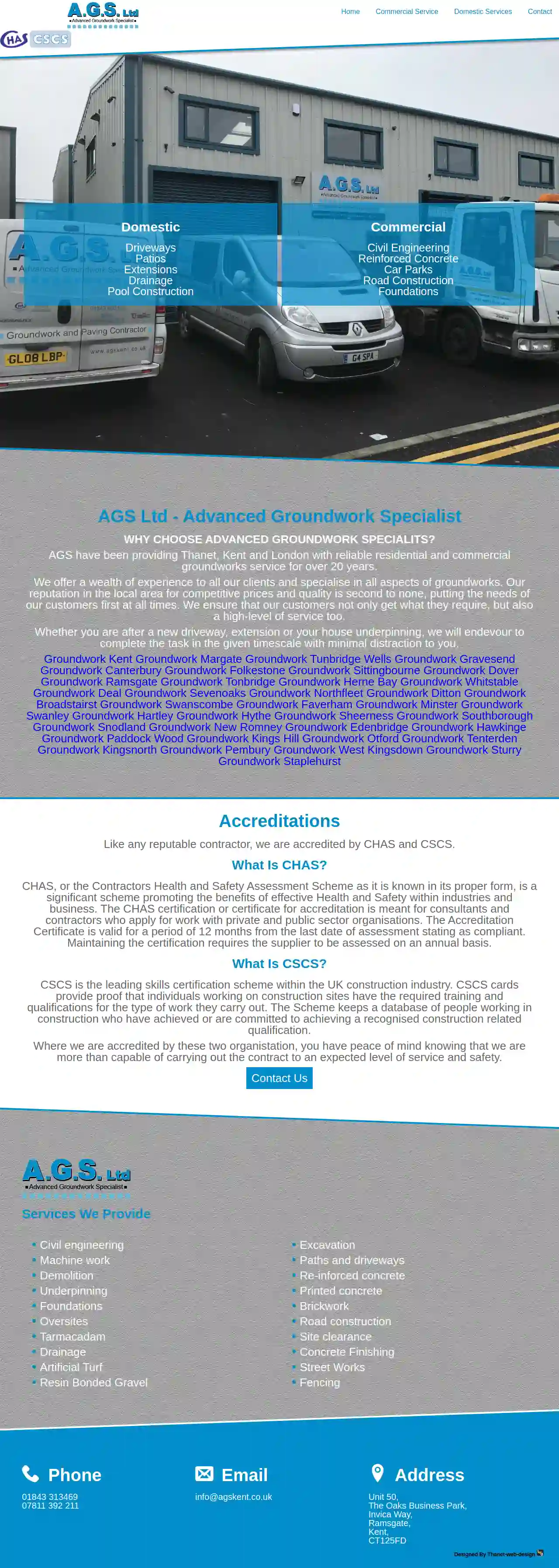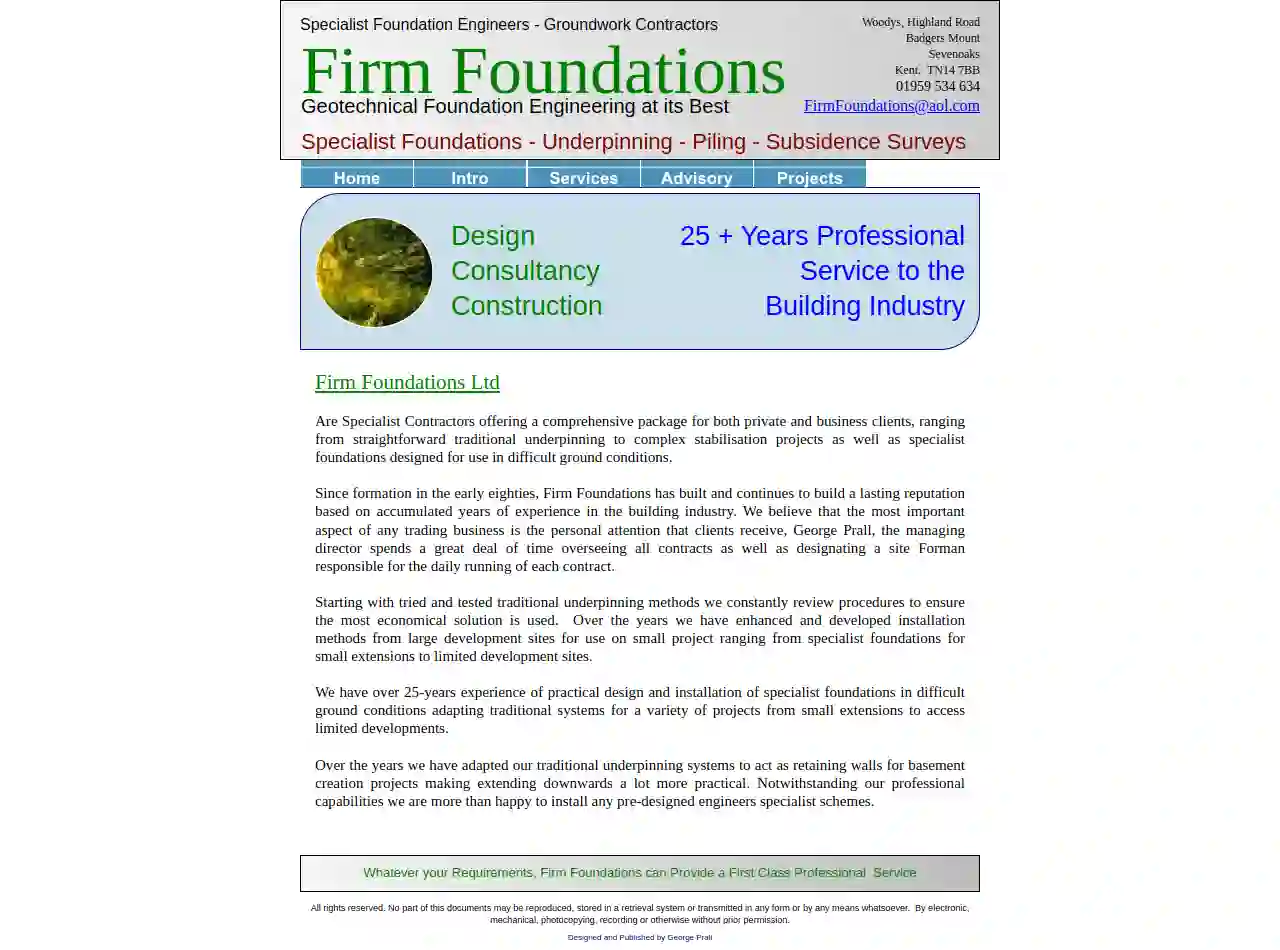Demolition Contractors Ashford
Top Demolition Contractors in Ashford
Get multiple Structure Demolition quotes for your project today! Compare profiles, reviews, accreditations, portfolio, etc... and choose the best offer.

Advanced Groundwork Specialist
1Unit 50, The Oaks Business Park, Invica Way, Ramsgate, Kent, CT125FD, GBAGS Ltd - Advanced Groundwork Specialist AGS have been providing Thanet, Kent and London with reliable residential and commercial groundworks service for over 20 years. We offer a wealth of experience to all our clients and specialise in all aspects of groundworks. Our reputation in the local area for competitive prices and quality is second to none, putting the needs of our customers first at all times. We ensure that our customers not only get what they require, but also a high-level of service too. Whether you are after a new driveway, extension or your house underpinning, we will endeavour to complete the task in the given timescale with minimal distraction to you. Accreditations Like any reputable contractor, we are accredited by CHAS and CSCS. What Is CHAS? CHAS, or the Contractors Health and Safety Assessment Scheme as it is known in its proper form, is a significant scheme promoting the benefits of effective Health and Safety within industries and business. The CHAS certification or certificate for accreditation is meant for consultants and contractors who apply for work with private and public sector organisations. The Accreditation Certificate is valid for a period of 12 months from the last date of assessment stating as compliant. Maintaining the certification requires the supplier to be assessed on an annual basis. What Is CSCS? CSCS is the leading skills certification scheme within the UK construction industry. CSCS cards provide proof that individuals working on construction sites have the required training and qualifications for the type of work they carry out. The Scheme keeps a database of people working in construction who have achieved or are committed to achieving a recognised construction related qualification. Where we are accredited by these two organisations, you have peace of mind knowing that we are more than capable of carrying out the contract to an expected level of service and safety.
- Services
- Why Us?
- Accreditations
- Gallery
Get Quote- E&
E&G Excavating
56 reviewsDover, GB- Services
- Why Us?
Get Quote - Ga
Gaughans Group
513 reviewsRamsgate, GB- Services
- Why Us?
Get Quote - Mt
Mt. Hope Trucking & Excavating, Inc.
52 reviewsDover, GB- Services
- Why Us?
Get Quote - Ar
Architectural Archaeology
1Ramsgate, GB- Services
- Why Us?
Get Quote - MJ
MJM Groundworks
1Ramsgate, GB- Services
- Why Us?
Get Quote 
Firm Foundations
51 reviewsWoodys, Highland Road, Badgers Mount, TN14 7BB, GBFirm Foundations Ltd Are Specialist Contractors offering a comprehensive package for both private and business clients, ranging from straightforward traditional underpinning to complex stabilisation projects as well as specialist foundations designed for use in difficult ground conditions. Since formation in the early eighties, Firm Foundations has built and continues to build a lasting reputation based on accumulated years of experience in the building industry. We believe that the most important aspect of any trading business is the personal attention that clients receive, George Prall, the managing director spends a great deal of time overseeing all contracts as well as designating a site Forman responsible for the daily running of each contract. Starting with tried and tested traditional underpinning methods we constantly review procedures to ensure the most economical solution is used. Over the years we have enhanced and developed installation methods from large development sites for use on small project ranging from specialist foundations for small extensions to limited development sites. We have over 25-years experience of practical design and installation of specialist foundations in difficult ground conditions adapting traditional systems for a variety of projects from small extensions to access limited developments. Over the years we have adapted our traditional underpinning systems to act as retaining walls for basement creation projects making extending downwards a lot more practical. Notwithstanding our professional capabilities we are more than happy to install any pre-designed engineers specialist schemes. Whatever your Requirements, Firm Foundations can Provide a First Class Professional Service 25 + Years Professional Service to the Building Industry
- Services
- Why Us?
- Gallery
Get Quote- Di
Digitise This
51 reviewsWhitstable, GB- Services
- Why Us?
Get Quote - Na
National Trust - The White Cliffs of Dover
4.85 reviewsDover, GB- Services
- Why Us?
Get Quote - Ba
Barratt Homes - Spitfire Green
56 reviewsRamsgate, GB- Services
- Why Us?
Get Quote
Over 11,537+ Excavation Contractors on our platform
Our excavation experts operate in Ashford & surrounding areas!
ExcavationHQ has curated and vetted Top Excavation Pros in Ashford. Find a reliable business today.
Frequently Asked Questions About Demolition Contractors
- 'Can I see proof of your licensing and insurance?' Verify their credentials and coverage.
- 'What experience do you have with projects like mine?' Ensure they have relevant expertise.
- 'Can you provide references from past clients?' Check their reputation and customer satisfaction.
- 'What are your safety protocols?' Prioritize contractors who emphasize safety.
- 'How will you handle hazardous materials?' Ensure they have proper procedures for asbestos or lead abatement.
- 'What is your timeline for completing the project?' Understand the project duration.
- 'How will you manage noise, dust, and debris?' Discuss mitigation measures for minimizing disruption.
- 'What are your payment terms?' Clarify payment schedules and any required deposits.
- Implosion: Using explosives to collapse a structure inwards rapidly. Suitable for large buildings in open areas.
- Wrecking Ball: Swinging a large steel ball to impact and break down the structure. Effective for bringing down walls and other solid elements.
- High-Reach Demolition: Utilizing specialized excavators with extended arms and demolition attachments for dismantling tall structures piece by piece.
- Selective Demolition: Removing specific parts of a building while preserving other sections. Often used in renovation projects.
- Deconstruction: Carefully dismantling a building to salvage reusable materials, reducing waste and environmental impact.
What is the difference between demolition and deconstruction?
Demolition: Typically involves bringing down a structure quickly and efficiently, often using heavy machinery and potentially explosives. The primary goal is to clear the site.
Deconstruction: Focuses on carefully dismantling a building piece by piece to salvage reusable materials. It prioritizes minimizing waste and environmental impact, often involving manual labor and specialized tools.
The choice between demolition and deconstruction depends on the project's objectives, budget, and environmental considerations.
What questions should I ask a demolition contractor before hiring them?
What are the different types of demolition?
Do I need a permit for demolition?
What is the difference between demolition and deconstruction?
Demolition: Typically involves bringing down a structure quickly and efficiently, often using heavy machinery and potentially explosives. The primary goal is to clear the site.
Deconstruction: Focuses on carefully dismantling a building piece by piece to salvage reusable materials. It prioritizes minimizing waste and environmental impact, often involving manual labor and specialized tools.
The choice between demolition and deconstruction depends on the project's objectives, budget, and environmental considerations.
What questions should I ask a demolition contractor before hiring them?
- 'Can I see proof of your licensing and insurance?' Verify their credentials and coverage.
- 'What experience do you have with projects like mine?' Ensure they have relevant expertise.
- 'Can you provide references from past clients?' Check their reputation and customer satisfaction.
- 'What are your safety protocols?' Prioritize contractors who emphasize safety.
- 'How will you handle hazardous materials?' Ensure they have proper procedures for asbestos or lead abatement.
- 'What is your timeline for completing the project?' Understand the project duration.
- 'How will you manage noise, dust, and debris?' Discuss mitigation measures for minimizing disruption.
- 'What are your payment terms?' Clarify payment schedules and any required deposits.
What are the different types of demolition?
- Implosion: Using explosives to collapse a structure inwards rapidly. Suitable for large buildings in open areas.
- Wrecking Ball: Swinging a large steel ball to impact and break down the structure. Effective for bringing down walls and other solid elements.
- High-Reach Demolition: Utilizing specialized excavators with extended arms and demolition attachments for dismantling tall structures piece by piece.
- Selective Demolition: Removing specific parts of a building while preserving other sections. Often used in renovation projects.
- Deconstruction: Carefully dismantling a building to salvage reusable materials, reducing waste and environmental impact.